Case Study: Folic Acid Deficiency Impact on Fetal Development
VerifiedAdded on 2023/04/26
|6
|1485
|270
Case Study
AI Summary
This case study focuses on a 29-year-old pregnant woman, Felicity, with diabetes mellitus and the implications of her folic acid deficiency on the developing fetus. The study explores the importance of folic acid during pregnancy, particularly in the first trimester, highlighting its role in neural tube development and the potential risks associated with deficiency, such as neural tube defects, congenital heart defects, and anemia. It also examines the impact of diabetes and metformin therapy on folate levels. The case study discusses the maternal serum marker test (triple test) for detecting fetal defects and emphasizes the need for folic acid supplementation to mitigate risks and ensure a healthy pregnancy. References to relevant research articles are also included.
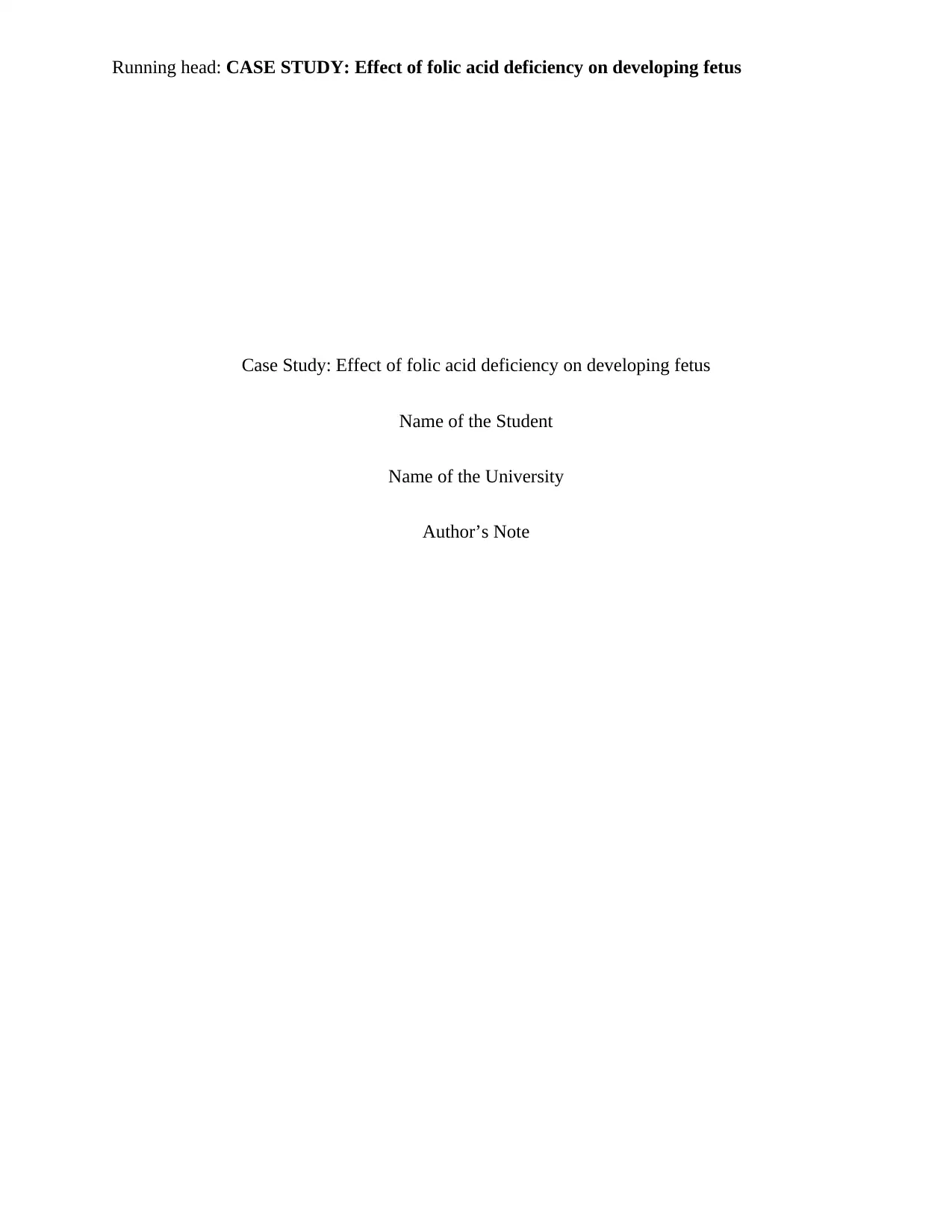
Running head: CASE STUDY: Effect of folic acid deficiency on developing fetus
Case Study: Effect of folic acid deficiency on developing fetus
Name of the Student
Name of the University
Author’s Note
Case Study: Effect of folic acid deficiency on developing fetus
Name of the Student
Name of the University
Author’s Note
Paraphrase This Document
Need a fresh take? Get an instant paraphrase of this document with our AI Paraphraser
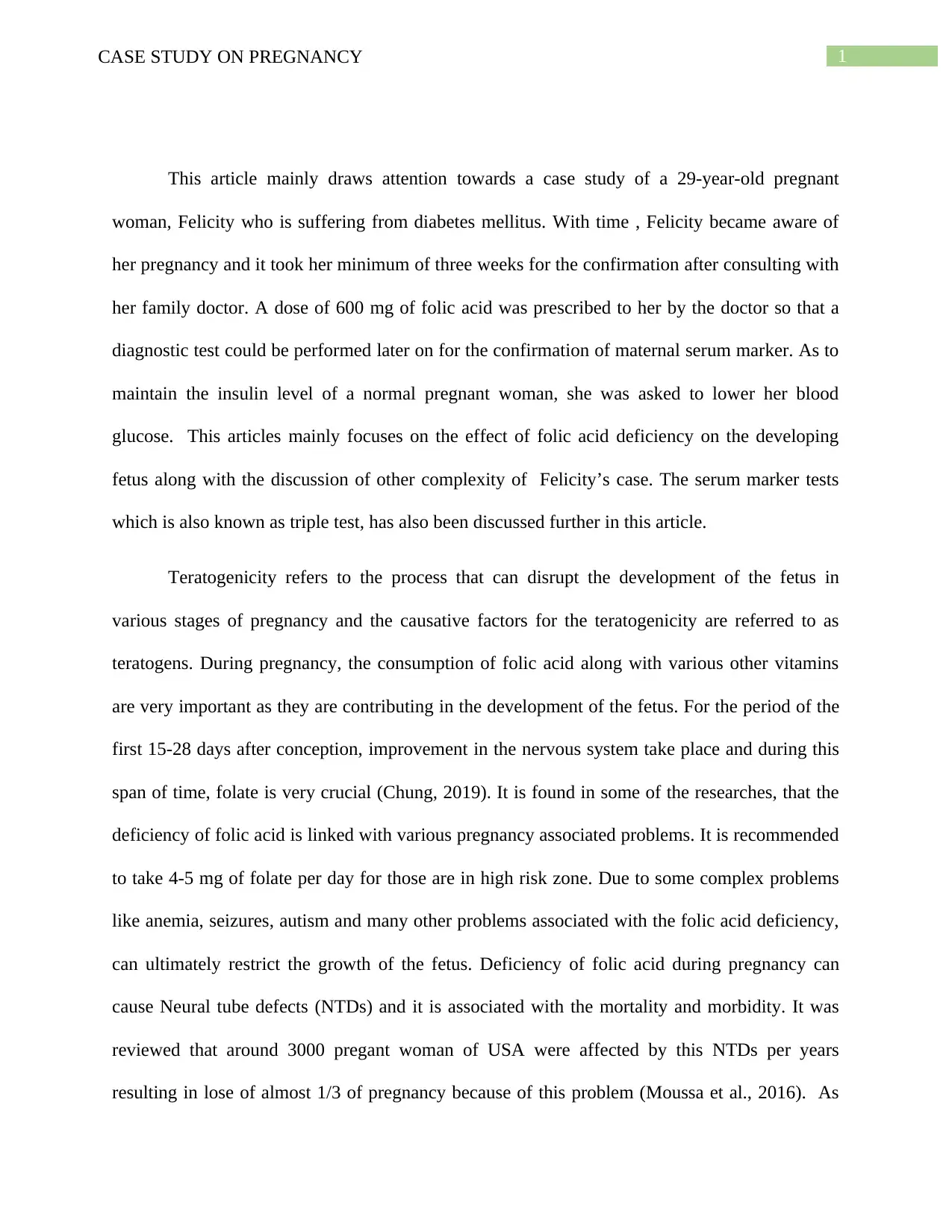
1CASE STUDY ON PREGNANCY
This article mainly draws attention towards a case study of a 29-year-old pregnant
woman, Felicity who is suffering from diabetes mellitus. With time , Felicity became aware of
her pregnancy and it took her minimum of three weeks for the confirmation after consulting with
her family doctor. A dose of 600 mg of folic acid was prescribed to her by the doctor so that a
diagnostic test could be performed later on for the confirmation of maternal serum marker. As to
maintain the insulin level of a normal pregnant woman, she was asked to lower her blood
glucose. This articles mainly focuses on the effect of folic acid deficiency on the developing
fetus along with the discussion of other complexity of Felicity’s case. The serum marker tests
which is also known as triple test, has also been discussed further in this article.
Teratogenicity refers to the process that can disrupt the development of the fetus in
various stages of pregnancy and the causative factors for the teratogenicity are referred to as
teratogens. During pregnancy, the consumption of folic acid along with various other vitamins
are very important as they are contributing in the development of the fetus. For the period of the
first 15-28 days after conception, improvement in the nervous system take place and during this
span of time, folate is very crucial (Chung, 2019). It is found in some of the researches, that the
deficiency of folic acid is linked with various pregnancy associated problems. It is recommended
to take 4-5 mg of folate per day for those are in high risk zone. Due to some complex problems
like anemia, seizures, autism and many other problems associated with the folic acid deficiency,
can ultimately restrict the growth of the fetus. Deficiency of folic acid during pregnancy can
cause Neural tube defects (NTDs) and it is associated with the mortality and morbidity. It was
reviewed that around 3000 pregant woman of USA were affected by this NTDs per years
resulting in lose of almost 1/3 of pregnancy because of this problem (Moussa et al., 2016). As
This article mainly draws attention towards a case study of a 29-year-old pregnant
woman, Felicity who is suffering from diabetes mellitus. With time , Felicity became aware of
her pregnancy and it took her minimum of three weeks for the confirmation after consulting with
her family doctor. A dose of 600 mg of folic acid was prescribed to her by the doctor so that a
diagnostic test could be performed later on for the confirmation of maternal serum marker. As to
maintain the insulin level of a normal pregnant woman, she was asked to lower her blood
glucose. This articles mainly focuses on the effect of folic acid deficiency on the developing
fetus along with the discussion of other complexity of Felicity’s case. The serum marker tests
which is also known as triple test, has also been discussed further in this article.
Teratogenicity refers to the process that can disrupt the development of the fetus in
various stages of pregnancy and the causative factors for the teratogenicity are referred to as
teratogens. During pregnancy, the consumption of folic acid along with various other vitamins
are very important as they are contributing in the development of the fetus. For the period of the
first 15-28 days after conception, improvement in the nervous system take place and during this
span of time, folate is very crucial (Chung, 2019). It is found in some of the researches, that the
deficiency of folic acid is linked with various pregnancy associated problems. It is recommended
to take 4-5 mg of folate per day for those are in high risk zone. Due to some complex problems
like anemia, seizures, autism and many other problems associated with the folic acid deficiency,
can ultimately restrict the growth of the fetus. Deficiency of folic acid during pregnancy can
cause Neural tube defects (NTDs) and it is associated with the mortality and morbidity. It was
reviewed that around 3000 pregant woman of USA were affected by this NTDs per years
resulting in lose of almost 1/3 of pregnancy because of this problem (Moussa et al., 2016). As
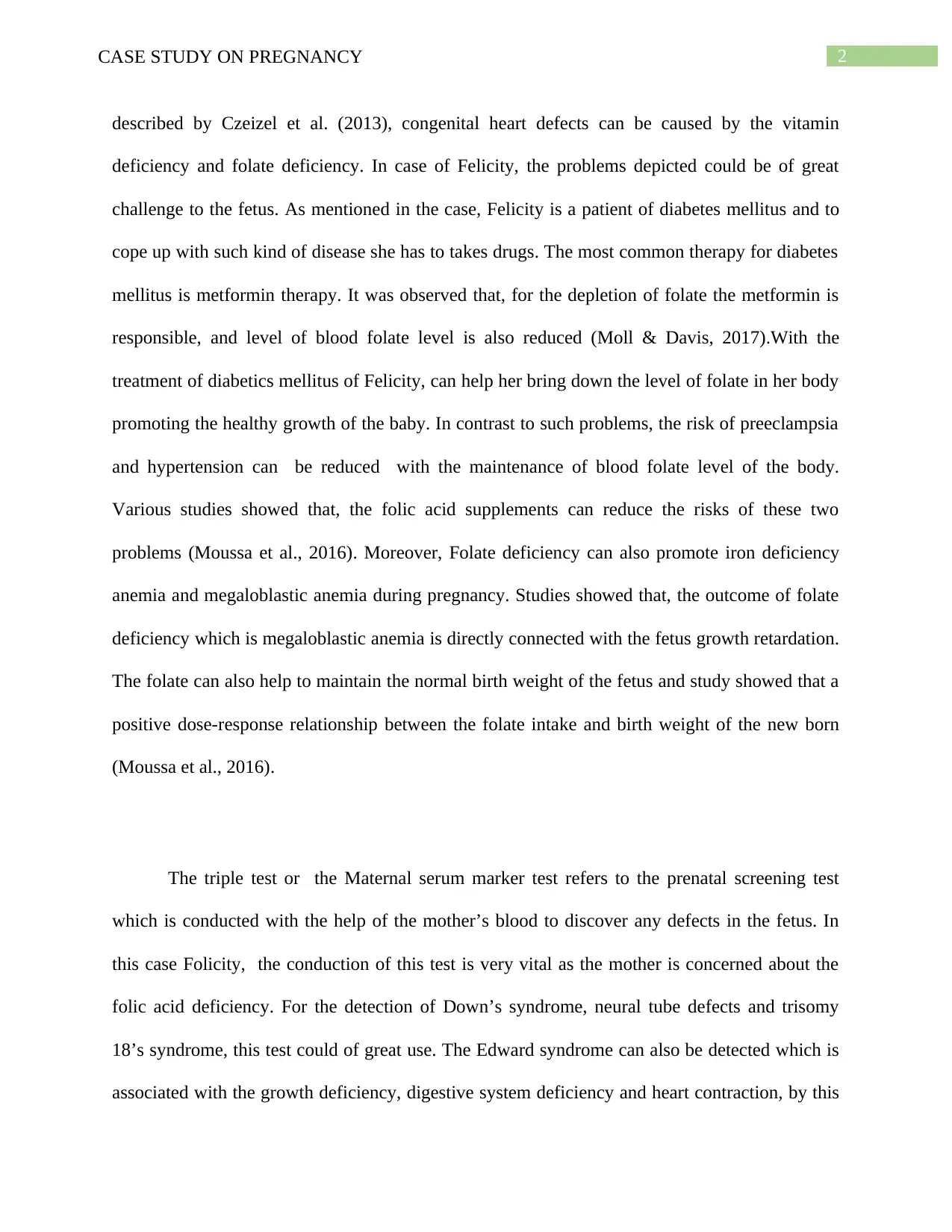
2CASE STUDY ON PREGNANCY
described by Czeizel et al. (2013), congenital heart defects can be caused by the vitamin
deficiency and folate deficiency. In case of Felicity, the problems depicted could be of great
challenge to the fetus. As mentioned in the case, Felicity is a patient of diabetes mellitus and to
cope up with such kind of disease she has to takes drugs. The most common therapy for diabetes
mellitus is metformin therapy. It was observed that, for the depletion of folate the metformin is
responsible, and level of blood folate level is also reduced (Moll & Davis, 2017).With the
treatment of diabetics mellitus of Felicity, can help her bring down the level of folate in her body
promoting the healthy growth of the baby. In contrast to such problems, the risk of preeclampsia
and hypertension can be reduced with the maintenance of blood folate level of the body.
Various studies showed that, the folic acid supplements can reduce the risks of these two
problems (Moussa et al., 2016). Moreover, Folate deficiency can also promote iron deficiency
anemia and megaloblastic anemia during pregnancy. Studies showed that, the outcome of folate
deficiency which is megaloblastic anemia is directly connected with the fetus growth retardation.
The folate can also help to maintain the normal birth weight of the fetus and study showed that a
positive dose-response relationship between the folate intake and birth weight of the new born
(Moussa et al., 2016).
The triple test or the Maternal serum marker test refers to the prenatal screening test
which is conducted with the help of the mother’s blood to discover any defects in the fetus. In
this case Folicity, the conduction of this test is very vital as the mother is concerned about the
folic acid deficiency. For the detection of Down’s syndrome, neural tube defects and trisomy
18’s syndrome, this test could of great use. The Edward syndrome can also be detected which is
associated with the growth deficiency, digestive system deficiency and heart contraction, by this
described by Czeizel et al. (2013), congenital heart defects can be caused by the vitamin
deficiency and folate deficiency. In case of Felicity, the problems depicted could be of great
challenge to the fetus. As mentioned in the case, Felicity is a patient of diabetes mellitus and to
cope up with such kind of disease she has to takes drugs. The most common therapy for diabetes
mellitus is metformin therapy. It was observed that, for the depletion of folate the metformin is
responsible, and level of blood folate level is also reduced (Moll & Davis, 2017).With the
treatment of diabetics mellitus of Felicity, can help her bring down the level of folate in her body
promoting the healthy growth of the baby. In contrast to such problems, the risk of preeclampsia
and hypertension can be reduced with the maintenance of blood folate level of the body.
Various studies showed that, the folic acid supplements can reduce the risks of these two
problems (Moussa et al., 2016). Moreover, Folate deficiency can also promote iron deficiency
anemia and megaloblastic anemia during pregnancy. Studies showed that, the outcome of folate
deficiency which is megaloblastic anemia is directly connected with the fetus growth retardation.
The folate can also help to maintain the normal birth weight of the fetus and study showed that a
positive dose-response relationship between the folate intake and birth weight of the new born
(Moussa et al., 2016).
The triple test or the Maternal serum marker test refers to the prenatal screening test
which is conducted with the help of the mother’s blood to discover any defects in the fetus. In
this case Folicity, the conduction of this test is very vital as the mother is concerned about the
folic acid deficiency. For the detection of Down’s syndrome, neural tube defects and trisomy
18’s syndrome, this test could of great use. The Edward syndrome can also be detected which is
associated with the growth deficiency, digestive system deficiency and heart contraction, by this
⊘ This is a preview!⊘
Do you want full access?
Subscribe today to unlock all pages.

Trusted by 1+ million students worldwide
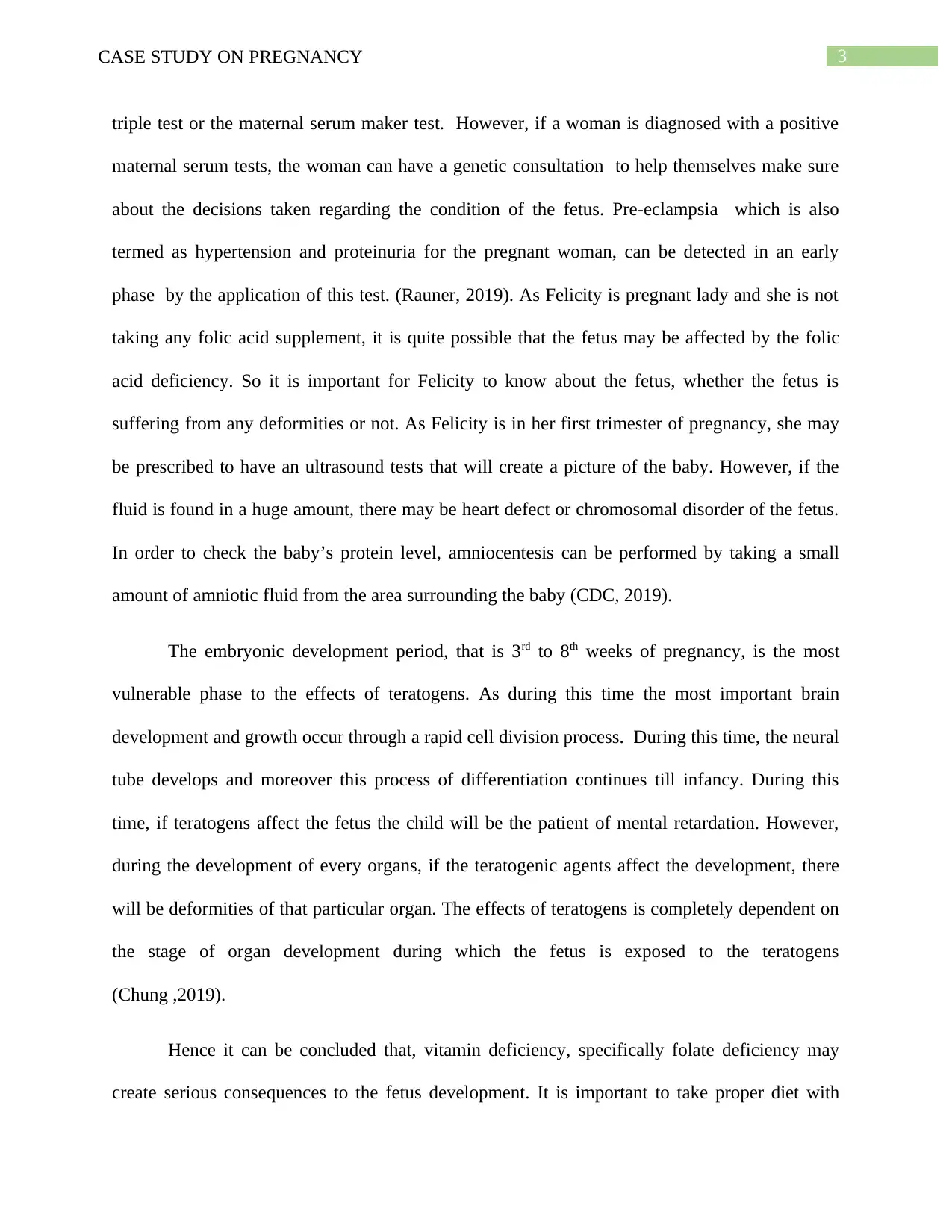
3CASE STUDY ON PREGNANCY
triple test or the maternal serum maker test. However, if a woman is diagnosed with a positive
maternal serum tests, the woman can have a genetic consultation to help themselves make sure
about the decisions taken regarding the condition of the fetus. Pre-eclampsia which is also
termed as hypertension and proteinuria for the pregnant woman, can be detected in an early
phase by the application of this test. (Rauner, 2019). As Felicity is pregnant lady and she is not
taking any folic acid supplement, it is quite possible that the fetus may be affected by the folic
acid deficiency. So it is important for Felicity to know about the fetus, whether the fetus is
suffering from any deformities or not. As Felicity is in her first trimester of pregnancy, she may
be prescribed to have an ultrasound tests that will create a picture of the baby. However, if the
fluid is found in a huge amount, there may be heart defect or chromosomal disorder of the fetus.
In order to check the baby’s protein level, amniocentesis can be performed by taking a small
amount of amniotic fluid from the area surrounding the baby (CDC, 2019).
The embryonic development period, that is 3rd to 8th weeks of pregnancy, is the most
vulnerable phase to the effects of teratogens. As during this time the most important brain
development and growth occur through a rapid cell division process. During this time, the neural
tube develops and moreover this process of differentiation continues till infancy. During this
time, if teratogens affect the fetus the child will be the patient of mental retardation. However,
during the development of every organs, if the teratogenic agents affect the development, there
will be deformities of that particular organ. The effects of teratogens is completely dependent on
the stage of organ development during which the fetus is exposed to the teratogens
(Chung ,2019).
Hence it can be concluded that, vitamin deficiency, specifically folate deficiency may
create serious consequences to the fetus development. It is important to take proper diet with
triple test or the maternal serum maker test. However, if a woman is diagnosed with a positive
maternal serum tests, the woman can have a genetic consultation to help themselves make sure
about the decisions taken regarding the condition of the fetus. Pre-eclampsia which is also
termed as hypertension and proteinuria for the pregnant woman, can be detected in an early
phase by the application of this test. (Rauner, 2019). As Felicity is pregnant lady and she is not
taking any folic acid supplement, it is quite possible that the fetus may be affected by the folic
acid deficiency. So it is important for Felicity to know about the fetus, whether the fetus is
suffering from any deformities or not. As Felicity is in her first trimester of pregnancy, she may
be prescribed to have an ultrasound tests that will create a picture of the baby. However, if the
fluid is found in a huge amount, there may be heart defect or chromosomal disorder of the fetus.
In order to check the baby’s protein level, amniocentesis can be performed by taking a small
amount of amniotic fluid from the area surrounding the baby (CDC, 2019).
The embryonic development period, that is 3rd to 8th weeks of pregnancy, is the most
vulnerable phase to the effects of teratogens. As during this time the most important brain
development and growth occur through a rapid cell division process. During this time, the neural
tube develops and moreover this process of differentiation continues till infancy. During this
time, if teratogens affect the fetus the child will be the patient of mental retardation. However,
during the development of every organs, if the teratogenic agents affect the development, there
will be deformities of that particular organ. The effects of teratogens is completely dependent on
the stage of organ development during which the fetus is exposed to the teratogens
(Chung ,2019).
Hence it can be concluded that, vitamin deficiency, specifically folate deficiency may
create serious consequences to the fetus development. It is important to take proper diet with
Paraphrase This Document
Need a fresh take? Get an instant paraphrase of this document with our AI Paraphraser
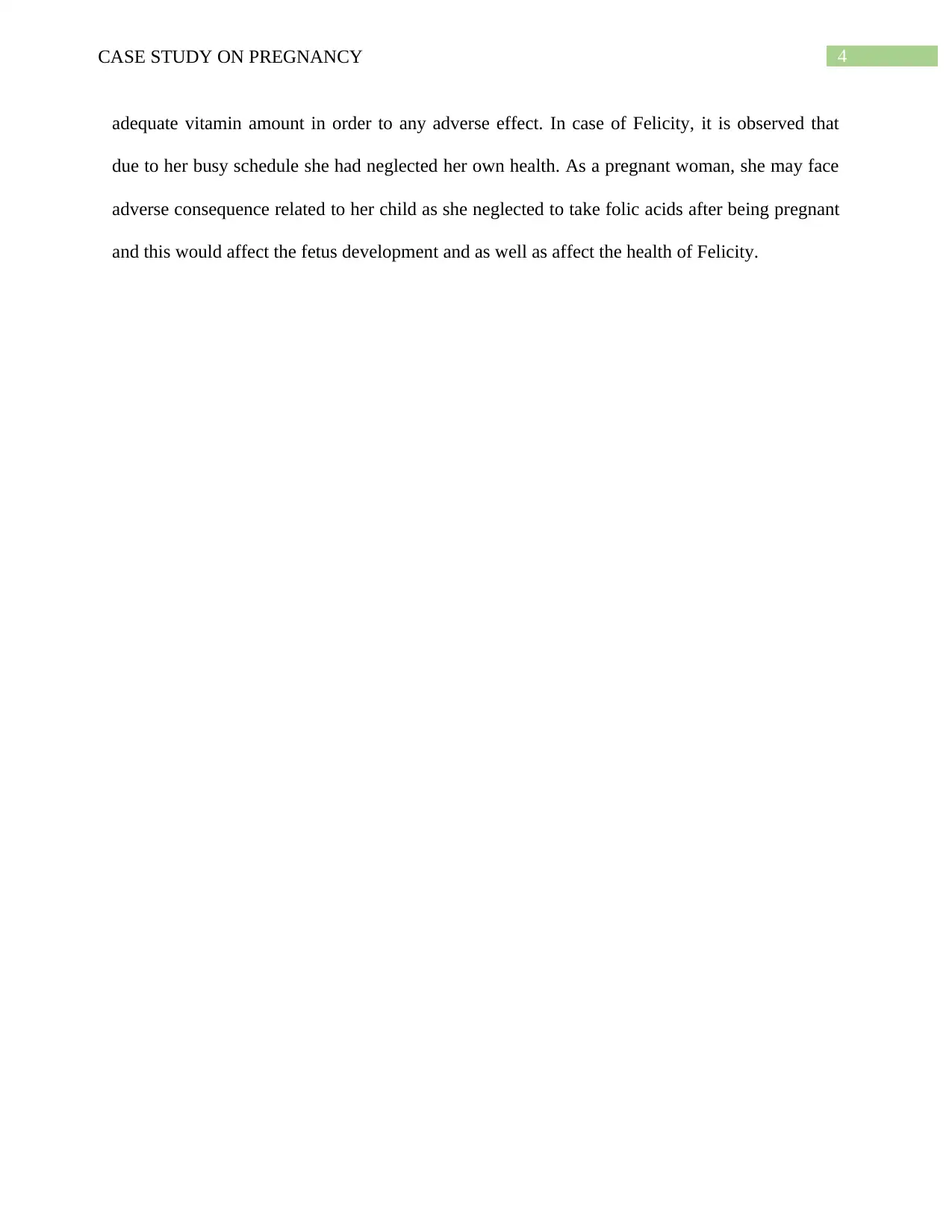
4CASE STUDY ON PREGNANCY
adequate vitamin amount in order to any adverse effect. In case of Felicity, it is observed that
due to her busy schedule she had neglected her own health. As a pregnant woman, she may face
adverse consequence related to her child as she neglected to take folic acids after being pregnant
and this would affect the fetus development and as well as affect the health of Felicity.
adequate vitamin amount in order to any adverse effect. In case of Felicity, it is observed that
due to her busy schedule she had neglected her own health. As a pregnant woman, she may face
adverse consequence related to her child as she neglected to take folic acids after being pregnant
and this would affect the fetus development and as well as affect the health of Felicity.
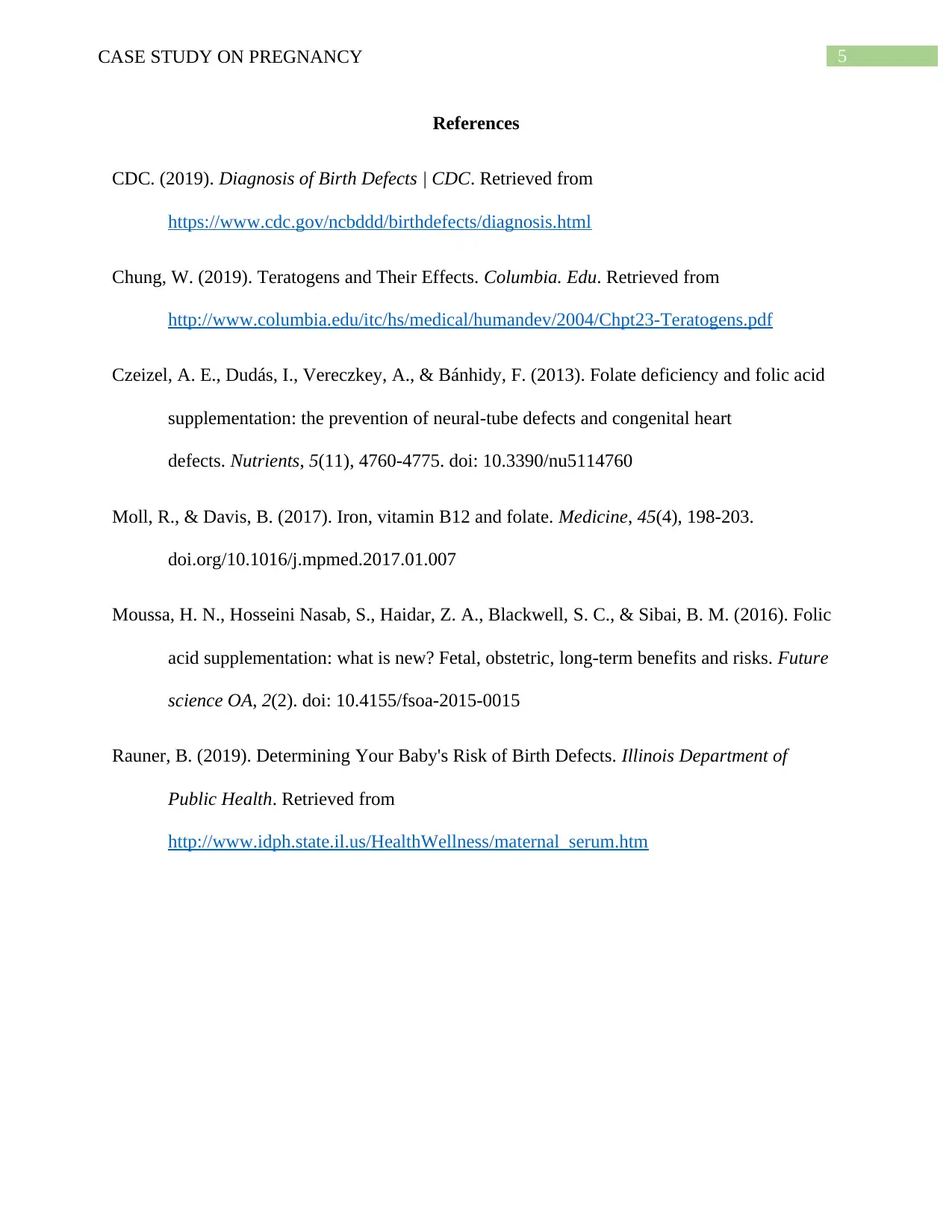
5CASE STUDY ON PREGNANCY
References
CDC. (2019). Diagnosis of Birth Defects | CDC. Retrieved from
https://www.cdc.gov/ncbddd/birthdefects/diagnosis.html
Chung, W. (2019). Teratogens and Their Effects. Columbia. Edu. Retrieved from
http://www.columbia.edu/itc/hs/medical/humandev/2004/Chpt23-Teratogens.pdf
Czeizel, A. E., Dudás, I., Vereczkey, A., & Bánhidy, F. (2013). Folate deficiency and folic acid
supplementation: the prevention of neural-tube defects and congenital heart
defects. Nutrients, 5(11), 4760-4775. doi: 10.3390/nu5114760
Moll, R., & Davis, B. (2017). Iron, vitamin B12 and folate. Medicine, 45(4), 198-203.
doi.org/10.1016/j.mpmed.2017.01.007
Moussa, H. N., Hosseini Nasab, S., Haidar, Z. A., Blackwell, S. C., & Sibai, B. M. (2016). Folic
acid supplementation: what is new? Fetal, obstetric, long-term benefits and risks. Future
science OA, 2(2). doi: 10.4155/fsoa-2015-0015
Rauner, B. (2019). Determining Your Baby's Risk of Birth Defects. Illinois Department of
Public Health. Retrieved from
http://www.idph.state.il.us/HealthWellness/maternal_serum.htm
References
CDC. (2019). Diagnosis of Birth Defects | CDC. Retrieved from
https://www.cdc.gov/ncbddd/birthdefects/diagnosis.html
Chung, W. (2019). Teratogens and Their Effects. Columbia. Edu. Retrieved from
http://www.columbia.edu/itc/hs/medical/humandev/2004/Chpt23-Teratogens.pdf
Czeizel, A. E., Dudás, I., Vereczkey, A., & Bánhidy, F. (2013). Folate deficiency and folic acid
supplementation: the prevention of neural-tube defects and congenital heart
defects. Nutrients, 5(11), 4760-4775. doi: 10.3390/nu5114760
Moll, R., & Davis, B. (2017). Iron, vitamin B12 and folate. Medicine, 45(4), 198-203.
doi.org/10.1016/j.mpmed.2017.01.007
Moussa, H. N., Hosseini Nasab, S., Haidar, Z. A., Blackwell, S. C., & Sibai, B. M. (2016). Folic
acid supplementation: what is new? Fetal, obstetric, long-term benefits and risks. Future
science OA, 2(2). doi: 10.4155/fsoa-2015-0015
Rauner, B. (2019). Determining Your Baby's Risk of Birth Defects. Illinois Department of
Public Health. Retrieved from
http://www.idph.state.il.us/HealthWellness/maternal_serum.htm
⊘ This is a preview!⊘
Do you want full access?
Subscribe today to unlock all pages.

Trusted by 1+ million students worldwide
1 out of 6
Your All-in-One AI-Powered Toolkit for Academic Success.
+13062052269
info@desklib.com
Available 24*7 on WhatsApp / Email
![[object Object]](/_next/static/media/star-bottom.7253800d.svg)
Unlock your academic potential
Copyright © 2020–2026 A2Z Services. All Rights Reserved. Developed and managed by ZUCOL.

